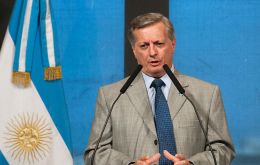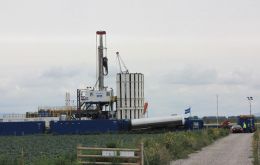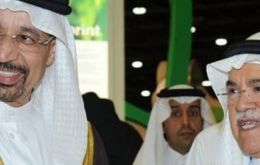MercoPress. South Atlantic News Agency
Energy & Oil
-
Saturday, June 4th 2016 - 08:57 UTC
YPF and ENAP agree to increase gas and oil production off Magellan Strait

Argentina's YPF and Chile's Enap Sipetrol announced a joint project to expand the production of natural gas and crude from the offshore Magallanes Deposits, (PIAM), to the east of Magellan Strait Reserve. Representatives from Tierra del Fuego province and Magallanes Region, and from the two companies, attended the announcement ceremony.
-
Friday, June 3rd 2016 - 06:40 UTC
Falklands are “my homeland”, with the right to freely choose our own future

The Falklands are a people, “my homeland”, with the right to freely choose our own future, as enshrined as leading principle in the UN Charter and safeguarded by the several covenants on civil and political rights, said Falklands' government representative Krysteen Ormond addressing the Pacific Regional Seminar of the C24, Special Decolonization Committee.
-
Monday, May 30th 2016 - 07:36 UTC
Venezuela's public sector will only work Mondays and Tuesdays for another two weeks

Venezuela's government on Saturday extended by two weeks a decree reducing the public sector workweek to Mondays and Tuesdays in a bid to tackle the oil-rich country's electricity crisis. The enforced leave was first announced in late April, a drastic move for a government also grappling with an economic crisis that has Venezuelans queuing for hours to buy scarce supplies.
-
Monday, May 30th 2016 - 06:49 UTC
Petrobras faces “tens of billions of dollars” in claims in US court; trial opens in September

Petrobras will finally get its day in a U.S. court on Sept. 19 in a trial that pits 18 former executives and 13 investment banks, including J.P. Morgan Securities, against U.S. and U.K. investors. Claimants are seeking “tens of billions of dollars” in losses from the Brazilian oil and gas giant.
-
Thursday, May 26th 2016 - 06:53 UTC
Rousseff claims Temer intends to “privatize” Brazil's pre-salt oil reserves

Brazil's suspended president, Dilma Rousseff, on Wednesday accused interim head of state Michel Temer of intending to “privatize” the oil discovered in recent years in deep waters of the Atlantic Ocean and thus deprive the nation's education sector of funding.
-
Thursday, May 26th 2016 - 06:05 UTC
Argentina confident Patagonia's shale formation foreign interest remains strong

Argentina's Vaca Muerta shale formation in Patagonia remains an attractive asset for international investors, many of which are looking to increase the amount they have invested so far, according to the country's Energy Minister Juan José Aranguren, a former Shell Argentina CEO.
-
Wednesday, May 25th 2016 - 08:35 UTC
Argentine government agrees a 400% cap on natural gas hikes for Patagonia provinces

The Argentine government has announced a cap on hikes to natural gas prices for the country’s southernmost provinces, after pushback from governors, the Judiciary and even local demonstrators prompted Energy Minister Juan Jose Aranguren to reconsider the scope of his most recent reforms.
-
Wednesday, May 25th 2016 - 07:02 UTC
UK tremor: North Yorkshire approve fracking operations

The first fracking operation in the UK since 2011 earthquake scares has been approved by North Yorkshire councilors, stirring a fresh debate on the benefits and risks of the controversial gas extraction method. Councilors granted permission to UK firm Third Energy to use hydraulic fracturing, or fracking, at an existing drilling site near the village of Kirby Misperton.
-
Monday, May 23rd 2016 - 11:28 UTC
What does the next OPEC meeting have in store?

The next OPEC meeting on the 2nd of June will act as little more than a forum for continued altercations between Saudi Arabia and Iran. The 2 June 2016 OPEC meeting will be held amid a backdrop of oil prices near $50 per barrel, a sharp drop in Nigerian production due to sabotage, turmoil in Venezuela, Saudi Arabia operating with a new oil minister, and Iran aggressively pumping close to pre-sanction levels.
-
Friday, May 20th 2016 - 11:05 UTC
Petrobras new CEO is a former energy minister and chief of staff

Former Brazilian energy minister Pedro Parente has been named by acting President Michel Temer as the new CEO of state-run oil giant Petrobras. Parente was picked Thursday to replace Aldemir Bendine, an appointee of now suspended President Dilma Rousseff. The new Petrobras CEO was working as chairman of Sao Paulo-based financial bourse BM&FBovespa.
